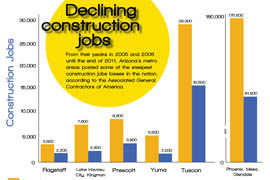Cronkite News has moved to a new home at cronkitenews.azpbs.org. Use this site to search archives from 2011 to May 2015. You can search the new site for current stories.
Phoenix, Lake Havasu posted nation’s largest construction job losses
WASHINGTON – Lori Nelson didn’t choose to leave Phoenix’s construction industry – she was forced out.
After a three-decade career in construction ended abruptly when she was laid off in 2009, Nelson had to choose between leaving Phoenix to find construction work elsewhere or changing careers to stay in the city with her family.
Nelson stayed and find other work, one of 93,600 people to lose construction work in Phoenix since the industry peaked in 2006. That was the largest job drop in a single market, according to an analysis by the Associated General Contractors of America.
The general contractors report also showed that the Lake Havasu metro area lost 70 percent of its construction jobs in recent years, the highest percentage drop among the 337 metro areas in the country.
“A lot of them (her colleagues) tried to just switch careers to find whatever work they could find, and some of them just moved,” said Nelson, 52, of Glendale. “Some of them went back to Mexico. It’s just so bad.”
The report measured different time periods in different markets, beginning when each market hit its peak and ending in December 2011. For Phoenix, the numbers dropped from 175,500 people in construction jobs in 2006 to 81,900 at the end of 2011.
The Lake Havasu and Kingman area peaked in December 2005 at 7,600 construction jobs and fell to 2,300, a loss of 5,300 workers or 70 percent.
The burst of the housing bubble was largely to blame, said Ken Simonson, chief economist for the Associated General Contractors of America.
“Up through about 2005, there was a widespread view that people could always sell a house whenever they wanted,” he said. “And then the music stopped, the lending was cut off, house prices started to decline. That hurt residential construction.
“It was a whole combination of things that came together and made a very bad scene for construction,” he said.
That housing downturn forced a lot of companies to shut down – including the construction inspection firm where Nelson worked.
“They were around the Valley for 40 years and they basically closed their doors because construction got so bad,” she said.
Those companies that survived cut crew sizes and many bosses got their hands dirty again.
“A lot of companies that were around are not around anymore,” said Mike Falvey, owner of MF Construction Group. “Now you have the younger owners at companies going back and swinging hammers themselves.”
But in recent months, Phoenix’s construction sector has begun to show new life. Simonson said the area has gotten past its reliance on residential construction and started picking up the slack with retail, clean-energy and medical construction.
“In the last 12 months, Phoenix has done somewhat better than the nation as a whole,” Simonson said. The area picked up 1,900 jobs from January 2011 to January 2012, according to a new analysis of employment numbers released this month by the Associated General Contractors of America.
“That shows the underlying strength of the Phoenix area – not just a place for retirees, vacationers or business travelers but as an employment center,” he said.
Simonson said the state’s construction industry as a whole has started to rebound in the last few months. Brett Jones agrees.
“Sometimes, especially in construction, you have to make it through those lean years to make it,” said Jones, vice president of operations for the Arizona Contractors Association.
Lake Havasu has yet to bounce back and some wonder if it ever will. Most expect the status quo to remain until home construction picks up again.
“That market has not recovered at all,” Simonson said. “That reflects the fact that people are still having trouble selling their homes and moving elsewhere.”
He said that after benefiting from years of retirees heading south, Lake Havasu is no longer building new homes because people either cannot afford to retire or cannot sell their homes and move.
“They’re stuck up in iceberg-land,” he said.
And those who are moving to Lake Havasu are trying to snatch up bargains on used homes, said Jim Keller, owner of Lake Havasu Home Improvement.
“Definitely they’re just scooping deals,” Keller said.
As in Phoenix, many construction workers left Lake Havasu, while those who stayed adapted, many shifting their focus to remodeling.
“Being a smaller economy, I think Lake Havasu has already taken its hit with the trades leaving,” Keller said. “The damage is done.”
Many echo his opinion that even though the state’s construction industry may be on the road to recovery, it will never return to the heights reached prior to the recession.
“I don’t think (it will improve) in 2012,” Nelson said, “but I think by 2013 it is going to get better.”








